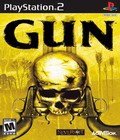
WP: In my experience with developers in the game industry, most of the guys out there are twenty-somethings. As a CPA from Great Falls, Montana, you come from a clearly different demographic, and yet I have a feeling it is because of your unique background that Gun is being made. In your opinion, how do you feel Gun will deliver, whereas the other attempts, like the one from Rockstar Games, failed?
Joel: Well I should probably go back and walk you thru Tony Hawk.
It is relevant, because when that idea came my way, I embraced it. I had skateboarded a lot when I was in the 7th, 8th, and 9th grades. So for me, when making these games, it is important that you completely embrace whatever genre or material that you’re dealing with.
A skateboarding game was totally easy, because I lived it. Interestingly enough, I was skating long before the bulk of the people I ended up working with had lived it.
In the early '70s, we ran around stealing plywood and building ramps. We didn’t have the concept yet that we should curve the ramp! We just hit it – from one 4x8 piece of plywood to another 4x8 to another.
So skateboarding I knew a little about that. Same thing with a cowboy game, I knew a little about that too.
WP: Speaking of which, you’ve mentioned that you come from Montana. That is a far cry from Los Angeles and most gaming centers, but it sounds like you took a passion, specifically skating, and turned it into a viable career option. Was Tony Hawk your entrance into the industry?
Joel: No. Before that we’d done Apocalypse, which actually made Bruce Willis cool. (Editor’s Note – Apocalypse was a failed internal project at Activision featuring the voice acting of Bruce Willis. Neversoft was brought in to revive and finish the game in 1998.)
Pretty much concurrent with starting Tony Hawk, we started Spider-Man for the PlayStation. The reason we did Spider-Man was because Chad Finley, the lead designer on the project, was basically a 100% student of the Spider-Man universe.
So a lot of what you want to do when you make video games is take people who are passionate about their subject. They’re also good in their own right at what they do in respect to gaming (modeling, design, etc.).
Then you match those things up, and you have this thing that will basically build upon itself.
WP: Why do I get the feeling that working on games like Apocalypse and Spider-Man, you have assembled a team of guys like Chad, and everyone starts talking about doing a Western? Gun was not something that was pushed on you by the powers that be. You literally stepped up to the plate and said "My team wants to make a Western. Let’s make one." Am I correct in this assumption?
Joel: Well, you’re correct in that assumption, but you also have to consider that at this stage of life in the game industry, you need to look for what has NOT been done. So we fell upon the Western, which is something we can totally embrace.
The further we delved into the material, the more we knew that we could take all of the different scenarios that came to pass from 1860 to 1890. There’s so much to work with there. There’s like a bazillion tales of heroism that are above and beyond what you could even imagine.
So, you’ve got that to work with, and then you’ve got "Oh wait! Nobody’s really done this…and done it RIGHT!" You put these two things together and then you’ve got very compelling argument for "Yeah, let’s do this!"
WP: Do you feel that you’ve captured the essence of what a Western is like?
Joel: Well, we had to something in addition to that…and that was to capture the gamers. The gamer is going to look at that it and say, "Oh yeah, that’s great. My old man liked something in Cowboy movies. Big f**king deal. Why should I play this video game?"
So BEFORE the capturing of the Western came, the list of what is going to be totally fun and entertaining to do in a Western game was written. And that’s basically the foundation for Gun. We started there. That’s where you have things like, "Can we make riding a horse and combat on a horse more entertaining than anything that has basically been done before?"
"How can we take the third-person shooter scenario, and make that totally bitchin'?"
Then we take these ideas, and combine them with our research on the Old West. You soon realize that in a lot of cases, the quick-draw gunfight is not like two guys a hundred feet apart, who are distanced from one another. Rather, it’s like we’re in a bar, it’s smokey, we’re very close. When I shoot you, I watch your freakin’ arm splat. At the same time, I’m expecting the exact same thing to come my way.
So you bring these things close up, slow-mo and visceral, and that’s the approach we took.
More articles about GUN












 Gun will be a GTA-style game, set in the West in the 1880s, in cities such as Dodge City and New Mexico's Las Vegas. The murderous 'Dodge City Gang' has been on a rampage and you seek revenge, hunting them down between Indians and Mexican pistoleros. Main mode of transportation is any horse you can find or steal, and of course, Gun will include high speed "horse" pursuits.
Gun will be a GTA-style game, set in the West in the 1880s, in cities such as Dodge City and New Mexico's Las Vegas. The murderous 'Dodge City Gang' has been on a rampage and you seek revenge, hunting them down between Indians and Mexican pistoleros. Main mode of transportation is any horse you can find or steal, and of course, Gun will include high speed "horse" pursuits.